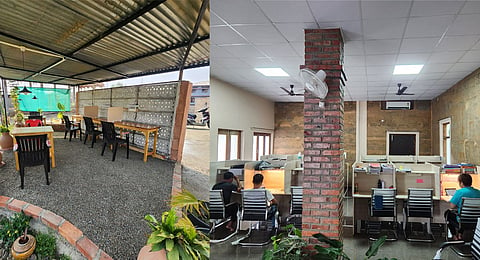

GUWAHATI: In Manipur’s Imphal valley, a quiet revolution is taking root — one with a scent of books, brews of black coffee and the quiet determination of young minds.
In just two years, the valley has witnessed the rise of over 30 private and community-led commercial libraries, giving birth to a thriving culture of self-study and silent resilience.
Frequent internet shutdowns and curfews during the bloody ethnic conflict are believed to be among reasons behind their birth. In 2023 alone when the violence broke out, Manipur experienced the world’s longest internet shutdown, totaling over 5,000 hours.
According to locals, most of these libraries have sprouted in Imphal East, Imphal West and Kakching districts.
They charge from Rs 800 to Rs 1,300 a month from visitors for services including curated seating areas with indoor and open-air zones, 24/7 power backup and high-speed Wi-Fi internet (with government permission during Internet ban), books including those for competitive exams, public policy, and literature. They also offer clean amenities, safe parking, and increasingly, attached cafes or tiffin counters.
One of them is ‘Oasis,’ which straddles 10,000 sq ft with lush lawns, high-speed internet, dedicated study cabins and outdoor zones. Sonny Chungkham, a public policy professional, founded it in Imphal West district.
He cited the ethnic tensions as one of the reasons behind the sudden surge in the number of private libraries.
“The last two years saw extended curfews, frequent internet shutdowns, and a prolonged ethnic unrest that disrupted daily life and academic routines. With coaching institutes shut or disrupted and online classes crippled due to internet ban, students and aspirants sought out alternatives and found calm in the private libraries,” says Chungkham.
Alongside libraries, Imphal has also witnessed a boom in independent bookstores, pop-up book stalls, and literary events. Spaces like Ukiyo Book Store and Readers Book Store are drawing in new readers. At the same time, the annual Imphal Book Fair and smaller book fests have become popular cultural landmarks.
“The demand for books has gone up, and people are genuinely curious—not just students, but young professionals, parents, even elders,” says a bookseller in Thangal Bazar. “Libraries and bookstores are feeding each other. One inspires the other,” he adds.
The library boom has been driven largely by local individuals and first-generation entrepreneurs—from recent graduates to UPSC aspirants, teachers to small business owners. Many used personal savings, small business loans, or crowdfunding to build these spaces.
“I used to feel isolated studying at home. Here, I feel being part of a collective rhythm,” says Laishram Roshan, a job aspirant.
Loya Ngamba Sapam, an MTech from IIT Delhi, says a library culture existed in the Imphal valley but it expanded after the Covid pandemic and the ethnic conflict.
“I have also seen business people visiting the private libraries. They do their business transactions online sitting amid soothing ambience. Some visit the libraries to join their online classes. There is seamless internet,” says Sapam.
He is a member of an organisation called ‘Youth Connect-The Champion for Change’ that gifted a library to a relief camp in Imphal West district.
An immediate result of the expansion of the library culture is that more Manipuri youth are taking national-level exams than ever before, according to locals. Study groups are forming. Reading clubs are taking off. The very language of aspiration in Manipur is being rewritten—one page at a time.